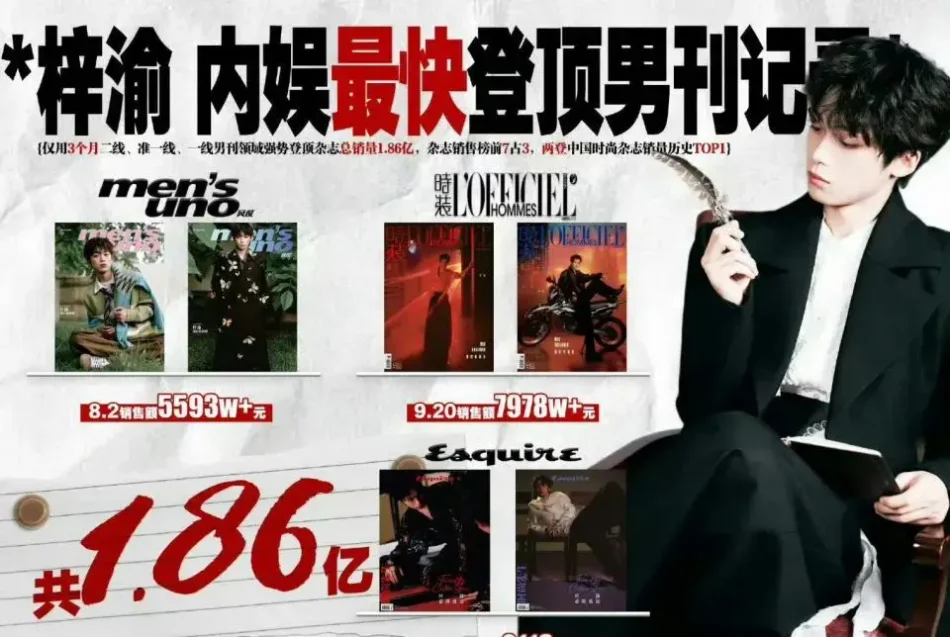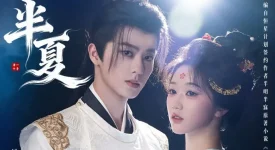When Huanwang Big Data named Zi Yu 梓渝 as the only representative of a new “3.0 top-tier” generation in Chinese entertainment, a heated debate quickly swept across the internet. Behind the controversy lies a deeper shift in how stars are made and how the industry defines success.
The first generation, or the 1.0 era, set the rules for traffic-driven fame. It was dominated by returning idols and youthful boy groups, represented by Luhan, Yang Yang, and TFBOYS (Wang Junkai, Wang Yuan, and Yi Yangqianxi). Their achievements, such as Luhan’s record-breaking Weibo post and TFBOYS’ nationwide influence, laid the foundation for the fan-economy model.

The 2.0 era further solidified traffic barriers. Adaptations of boys’ love novels and idol-training shows reshaped the landscape, pushing stars like Xiao Zhan and Wang Yibo, thanks to The Untamed, as well as Cai Xukun and Zhu Yilong into the spotlight. Their commercial value surged, yet many faced challenges in transitioning to more diverse and long-lasting careers.

The current 3.0 era is seen by some as a moment when “public choice overrides capital”. Zi Yu’s recognition sparked debate because it was based on striking data: his song “Ni Tan“ reached the top of the Billboard China chart; he broke multiple entertainment-industry records within five months; his print magazine sales hit historic highs; and his popularity continued to rise even after his drama finished airing.

Supporters view Zi Yu as a symbol of fan-driven success, while critics argue that established stars like Xiao Zhan, Wang Yibo, and Yi Yangqianxi still hold the true core resources of the industry. Some analysts also question whether Zi Yu’s numbers are inflated by fan-driven boosts, insisting that true top-tier status should be measured by broad public recognition and sustained work.
Zi Yu’s rise is inseparable from shifts occurring within the industry. His background as a “grassroots comeback” figure holds symbolic weight: he failed twice in idol-training competitions, carried heavy debt after terminating a contract, and survived on part-time jobs and minor acting roles. His unexpected breakthrough came in June 2025 with the low-budget drama Revenged Love. His studio was not even registered until September, leading insiders to call him “a victory no one in capital planned for”.
Zi Yu’s achievements span multiple areas. He drew over sixty thousand people to a single music festival performance and boosted local cultural tourism, earning official support from several cities. In business, he secured five high fashion endorsements within three months, and claimed the record for being the fastest artist in China’s entertainment industry to land a top men’s magazine cover. In August, his first solo magazine with Men’s Uno achieved 55.93 million yuan in sales in a single day, setting a new record in the industry. He also took on charity work as an ambassador for a hearing assistance initiative, with fans raising substantial donations.
For many in Gen Z, Zi Yu’s story resonates emotionally. With first-generation stars stepping back and second-generation stars focused on transformation, the public grew tired of overly packaged idols. Zi Yu’s “fight his way up from nothing” narrative satisfied a growing desire for authenticity and fueled a devoted fan community.
Still, disagreements remain. Some argue that Zi Yu lacks the nationwide cultural moments, like Luhan’s relationship announcement, that define true top-tier influence. Others believe that time is the ultimate test: stars such as Xiao Zhan and Yi Yangqianxi have proven their staying power across multiple cycles through solid work, while rapid data spikes may mask instability.
The debate also reflects the evolution of China’s star-making machine. From returning idols (1.0) to BL drama and talent show idols (2.0), and now to a “non-traditional path” (3.0), the shift mirrors policy restrictions and the public’s growing role in shaping fame. The number of top-tier figures has also narrowed dramatically, from several in earlier generations to just one being recognized in the latest framework.
In the end, only a few stars from any generation manage to transition from “traffic idols” to respected actors or artists. Many in the industry call for vigilance against data bubbles and emphasize that lasting influence should come from meaningful works and real social value rather than short-term popularity alone.








